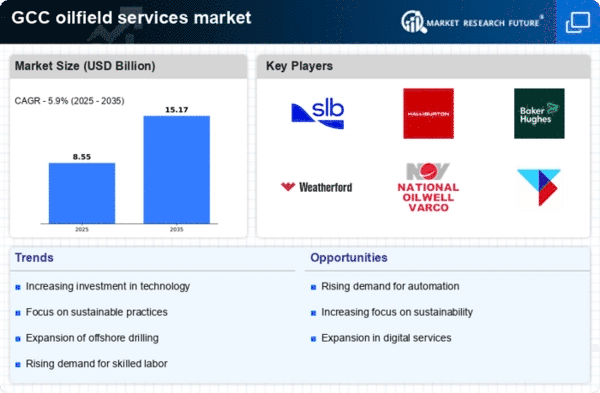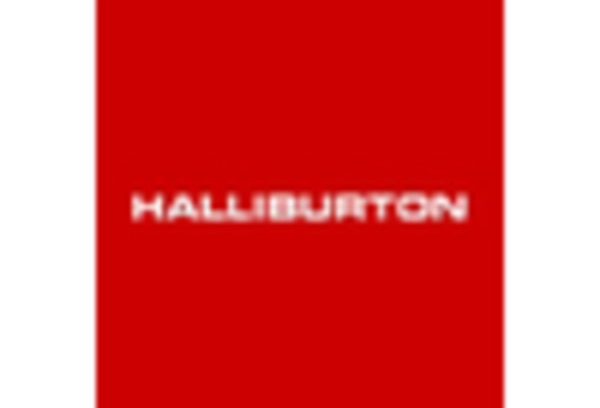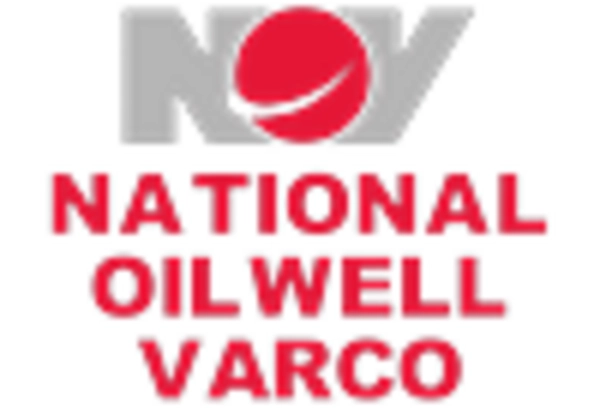Rising Energy Demand
The oilfield services market is experiencing a notable surge in demand driven by increasing energy needs across various sectors. In the GCC region, energy consumption is projected to grow at an annual rate of approximately 3.5% through 2025. This growth is largely attributed to population expansion and industrialization, which necessitate enhanced oil extraction and production capabilities. Consequently, oilfield services are becoming increasingly vital to meet this demand. The GCC countries, rich in hydrocarbon resources, are likely to invest heavily in oilfield services to optimize production efficiency and ensure energy security. This trend indicates a robust market environment for service providers, as they play a crucial role in supporting the region's energy infrastructure and operational requirements.
Investment in Infrastructure
Significant investments in oil and gas infrastructure are shaping the oilfield services market in the GCC. Governments in the region are allocating substantial budgets to develop and upgrade oilfield facilities, pipelines, and processing plants. For instance, the GCC countries are expected to invest over $200 billion in oil and gas infrastructure projects by 2025. This influx of capital is likely to create numerous opportunities for oilfield service companies, as they provide essential support in construction, maintenance, and operational efficiency. The focus on modernizing infrastructure not only enhances production capabilities but also aligns with the region's long-term strategic goals of maximizing resource utilization and ensuring sustainable growth in the oilfield services market.
Focus on Sustainability Practices
The oilfield services market is witnessing a growing emphasis on sustainability practices, driven by both regulatory pressures and market demand. GCC countries are increasingly prioritizing environmental stewardship and social responsibility in their oil and gas operations. This shift is prompting oilfield service providers to adopt greener technologies and practices, such as reducing carbon emissions and improving waste management. The market for sustainable oilfield services is projected to expand, with estimates suggesting a growth rate of 5% annually through 2025. This focus on sustainability not only aligns with global trends but also enhances the reputation of service providers, making them more appealing to clients who prioritize environmental considerations in their operations.
Regulatory Framework Enhancements
The evolving regulatory landscape in the GCC is influencing the oilfield services market significantly. Governments are implementing new regulations aimed at improving operational safety, environmental protection, and resource management. These regulations often require oilfield service providers to adopt advanced technologies and practices to comply with stringent standards. As a result, companies that can adapt to these regulatory changes are likely to gain a competitive edge. The emphasis on compliance may also lead to increased demand for specialized services, such as environmental assessments and safety audits, thereby expanding the scope of the oilfield services market. This dynamic environment suggests that service providers must remain agile and responsive to regulatory shifts to thrive.
Technological Advancements in Exploration
Technological advancements are reshaping the oilfield services market, particularly in exploration and production activities. Innovations such as enhanced oil recovery techniques, 3D seismic imaging, and automated drilling systems are becoming increasingly prevalent in the GCC. These technologies not only improve extraction efficiency but also reduce operational costs, making oilfield services more attractive to operators. The adoption of such technologies is expected to grow, with investments in research and development projected to reach $15 billion by 2025. This trend indicates a shift towards more sophisticated and efficient service offerings, positioning the oilfield services market for substantial growth as companies seek to leverage these advancements to optimize production.

















